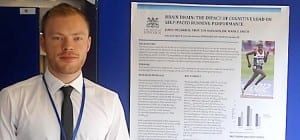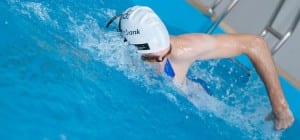New equipment obtained by the PESP group, will for the first time allow us to examine the impact of cognitive loading on our ability to pace during exercise performance. Research lead by Dr Mark F Smith and James Mccarron will use functional near-inferred spectroscopy (fNIRS) to measure the flow of oxygen within selected regions of the brain whilst participants both exercise and complete a series of cognitive challenges. The findings of this research hope to shed further light on the importance of central brain processes in the regulation of a pacing strategy during exercise performance.
James Mccarron presents his doctoral research at ISSSMC
 In August PESP group member and PhD student James Mccarron attended and presented part of his doctoral research at ISSSMC held at Northumbria University. This is one of the upcoming and most well respected conferences within the area. The title of his poster presentation was “Brain Drain: the impact of cognitive load on self-paced endurance running”. This research was novel as no study before has used a cognitive task throughout the entire duration of the bout of exercise used. In addition, no study has assessed the impact of such cognitive load on exercise performance which in this case was self-paced 5km run. The greater the cognitive load, i.e. use of neural processes mediated via prefrontal regions, the worse the performance in a 5km. In addition, there appears to be a draining effect on prefrontal dependent cognition throughout the 5km run. This may be due to a reduced amount of resources in this area of the brain or a competition between cognitive task performance and the execution of self-paced running. This has important theoretical and applied application to endurance exercise performance.
In August PESP group member and PhD student James Mccarron attended and presented part of his doctoral research at ISSSMC held at Northumbria University. This is one of the upcoming and most well respected conferences within the area. The title of his poster presentation was “Brain Drain: the impact of cognitive load on self-paced endurance running”. This research was novel as no study before has used a cognitive task throughout the entire duration of the bout of exercise used. In addition, no study has assessed the impact of such cognitive load on exercise performance which in this case was self-paced 5km run. The greater the cognitive load, i.e. use of neural processes mediated via prefrontal regions, the worse the performance in a 5km. In addition, there appears to be a draining effect on prefrontal dependent cognition throughout the 5km run. This may be due to a reduced amount of resources in this area of the brain or a competition between cognitive task performance and the execution of self-paced running. This has important theoretical and applied application to endurance exercise performance.
The physiological consequence of multi-sport activity
 Research recently published within the journal of Physiology and Behaviour by PESP members Daniel Taylor and Dr Mark F Smith has revealed the physiological consequence of multi-sport activity, such as triathlon, on overall performance. This study examined how residual fatigue affects the relationship between ratings of perceived exertion (RPE), physiological responses, and pacing during triathlon performance. Findings indicated that our perception of effort, measured through our rating of perceived exertion appears to be a key pace regulator during multi-sport endurance performance and can be used to further examine what limits our endurance capability.
Research recently published within the journal of Physiology and Behaviour by PESP members Daniel Taylor and Dr Mark F Smith has revealed the physiological consequence of multi-sport activity, such as triathlon, on overall performance. This study examined how residual fatigue affects the relationship between ratings of perceived exertion (RPE), physiological responses, and pacing during triathlon performance. Findings indicated that our perception of effort, measured through our rating of perceived exertion appears to be a key pace regulator during multi-sport endurance performance and can be used to further examine what limits our endurance capability.
Our new swimming flume puts athletes through the paces
 Researchers with the School of Sport and Exercise Science are putting athletes through the paces within their new swimming flume. Purchased to support research, teaching and consultancy activity, the PESP research team have already undertaken research using the flume to investigate the ole of pacing on triathlon. Lead researcher and PhD student Daniel Taylor has already published work within the journal Physiology and Behaviour, as well as presenting findings at the International Triathlon Conference in 2012 and 2013.
Researchers with the School of Sport and Exercise Science are putting athletes through the paces within their new swimming flume. Purchased to support research, teaching and consultancy activity, the PESP research team have already undertaken research using the flume to investigate the ole of pacing on triathlon. Lead researcher and PhD student Daniel Taylor has already published work within the journal Physiology and Behaviour, as well as presenting findings at the International Triathlon Conference in 2012 and 2013.
Can disease associated with inactive lifestyles be reduced?
The PESP research group are currently investigating how much the risk of disease associated with inactive lifestyles could be reduced if people exercised more at home.
 Given the rise of physical inactivity in the over-50s, scientists from the University of Lincoln’s School of Sport and Exercise Science are conducting a new programme of research to highlight the benefits of functional exercises that can be performed at home.
Given the rise of physical inactivity in the over-50s, scientists from the University of Lincoln’s School of Sport and Exercise Science are conducting a new programme of research to highlight the benefits of functional exercises that can be performed at home.
Led by Principal Lecturer Dr Mark F Smith, the team is now on the look-out for suitable volunteers who are keen to improve their health and fitness to take part in the study.
Dr Smith explained: “We are investigating the role of home-based resistance exercise on a large range of health factors such as microvascular and cardiovascular strength. We would like to hear from both males and females aged 50 and over who regard themselves as physically inactive, and have not purposefully engaged in planned sport or exercise on a regular basis for the past six-months.
“We already know that sedentary lifestyles can lead to increased risk of ill health, and with this new study we hope to add further insight into the benefit of home-based exercise on specific areas of fitness and wellbeing. By encouraging people to engage in exercise at home, we hope to show how beneficial it can be, without demanding the equipment, expense and time pressures often associated with sporting activities.”
The investigation builds upon an existing and evolving programme of research within the Lincoln School of Sport and Exercise Science. The School’s team of experts is undertaking a significant body of research to explore the role of moderate-intensity exercise interventions on vascular activity within sedentary older populations.
A first-phase research project funded through a University grant has already been published within the Clinical Sciences journal, and it is hoped that the outcomes of this new study will add to the growing understanding about the benefits of physical activity to overall health improvement.





